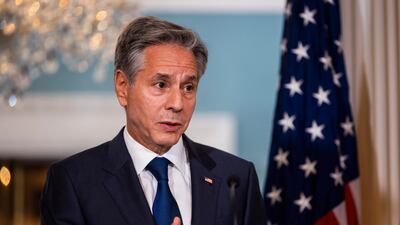Iran's move to bar some UN nuclear inspectors shows it is not interested in being responsible about its atomic programme, US Secretary of State Antony Blinken said on Friday.
The International Atomic Energy has also criticised Tehran for preventing its from monitoring its nuclear projects.
“We tried to work indirectly with Iran as well as with European partners and even Russia and China to see if we can get a return to compliance with the Iran nuclear deal," he said.
“But Iran couldn't or wouldn't do that. Just this past week, we saw them remove IAEA inspectors who are critical to doing the work at the IAEA to – as best you can – ensure that Iran is consistent with whatever obligations it has.
“That is not evidence of an Iran that is interested in actually being a responsible actor.”
The comments followed remarks by Iranian President Ebrahim Raisi, who said on Wednesday that relations with the US can move forward if the Biden administration demonstrates it wants to return to the 2015 nuclear deal.
A first step should be easing sanctions, he said.
“We have not left the table of negotiations,” Mr Raisi said.
Earlier, the head of the IAEA, Rafael Grossi, said the Iranian government’s removal of many cameras and electronic monitoring systems installed by the IAEA made it impossible to give assurances about the country’s nuclear programme.
The IAEA has reported that Iran has slowed the pace of enriching uranium to nearly weapons-grade levels.
Iran said it was responding to a call led by the US and three European allies for Tehran to co-operate with the Vienna-based agency on issues including explaining uranium traces found at undeclared sites.
One of the agency's purposes is to prevent the spread of nuclear weapons by verifying that states honour their obligations to use nuclear technology only for peaceful purposes.
The IAEA was responsible for verifying Iran's compliance with the defunct 2015 Iran nuclear deal, under which Tehran curbed its programme in return for the easing of US, EU and UN sanctions.
Efforts to revive that deal, which former US president Donald Trump abandoned in 2018, collapsed about a year ago, and Washington has been searching for a new way to get Tehran to restrain its programme.









